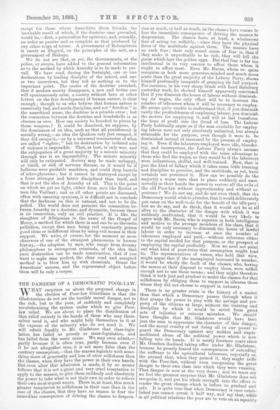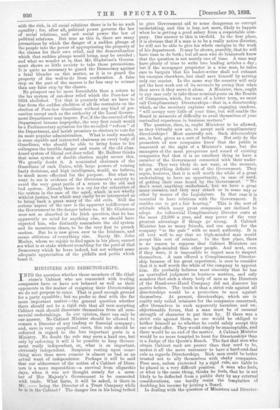THE DANGERS OF A DEMOCRATIC POOR-LAW.
WHAT surprises us about the proposed change in the election of Poor-law Guardians is that the Gladstonians do not see the terrible moral danger, not to the rich, but to the poor, of suddenly and completely revolutionising the system under which we give Poor- law relief. We are about to place the distribution of that relief entirely in the hands of those who may them- selves need it, and who might help themselves to it at the expense of the minority who do not need. it. We will admit frankly to Mr. Gladstone that class-legis- lation has failed as grossly as mass-legislation, and has failed from the same cause. We may even admit,— partly because it is often true, partly because even if it be not altogether true, it is not more false than the contrary assumption,—that the masses legislate with some- . thing more of generosity and less of utter selfishness than the classes, when they have the power in their own hands. But even after that admission is made, it by no means follows that it is not a great and very cruel temptation to apply to the masses, to give them suddenly and absolutely the power to take what is not their own in order to relieve their own most urgent wants. There is, at least, this much greater temptation to selfishness in their case than in the case of the classes, that they have no reason to fear the immediate consequence of driving the classes to despera- tion as much, or half as much, as the classes have reason to fear the immediate consequence of driving the masses to desperation. The classes have, at least, a wholesome fear of acting too selfishly,—since they have the physical force of the multitude against them. The masses have no such fear ; their only sound cause of fear is, that if they make it unprofitable to be rich, they will kill the goose which lays the golden eggs. But that fear is far too intellectual in its very essence to affect those whom it ought to affect most. Even Mr. Burns, whom we quite recognise as both more generous-minded and much more acute than the great majority of the Labour Party, shows himself profoundly incapable of grasping its full purport. For instance, in his very sharp brush with Lord Salisbury yesterday week, he showed himself apparently convinced that if you diminish the hours of labour without diminish- ing its wages, the only effect will be to increase the number of labourers whom it will be necessary to employ. He seems quite unable to understand that, if you diminish vastly the profitableness of employing labour, you diminish the motive for employing it, and will at last transform the hope of profit into the dread of loss. The Labour Party habitually argue as if the sum available for employ- ing labour were not only absolutely unlimited, but always attainable for the purpose, even though it were to be diminished instead of increased by the process of employ- ing it. Even if the labourers employed were idle, blunder- ing, and incompetent, the Labour Party always assume that they could be employed with the same advantage to those who find the wages, as they would be if the labourers were industrious, skilful, and well-trained. Now, that is just the kind of fallacy which it takes some little training and discipline to perceive, and the multitude, as yet, have certainly not perceived it. How can we possibly do the majority a worse turn than to place suddenly and unre- servedly in their hands the power to restore all the evils of the old Poor-law without apprenticeship and without ex- perience ? We do not say, and do not even think, that the Democracy would wish to plunder, that it would deliberately put rates on the well-to-do for the benefit of the idle poor ; but we do say, and do think, that it would not be at all alive to the character of the danger with which it was suddenly confronted, that it would be very likely to agree with Mr. Burns, who is superior in both intelligence and motive to the average members of his class, that it would be only necessary to diminish the hours -of lawful labour in order to increase at once the number of labourers employed and paid,—without reference either to the capital needed for that purpose, or the prospect of employing the capital profitably. Now we need not point out what kind of poor-rates that assumption might lead to. The representatives of voters, who held that view, might argue that if the unemployed increased in number, it would be wholly the fault of the classes, who, having the means at their disposal to employ them, were selfish enough not to use those means ; and they might therefore think it both just and prudent to mulct the classes for that selfishness by obliging them to support in idleness those whom they did not choose to support in industry. There is no greater crisis in the history of a nation than that which a Democracy passes through when it first grasps the power to play with the savings and pro- perty of the citizens at large, without the training and discipline by which it would be saved from great acts of injustice or ruinous mistakes. We should have thought that Mr. Gladstone would have been just the man to appreciate the character of this danger, and the moral cruelty of not doing all in our power to guard the Democracy against any Sudden and unpre- meditated abuse of the political power which is now falling into its hands. It is nearly fourteen years since Mr. Goschen declined taking office under Mr. Gladstone, because he greatly feared the consequences of extending the suffrage to the agricultural labourers, especially on the ground that, when they gained it, they might trifle with the Poor-law, without even recognising the great danger to their own class into which they were running. That danger is now at the very doors ; and we must say we feel the greatest surprise that Mr. Gladstone does not recognise it, and put his whole strength into the effort to render the great change which is before us gradual and safe. It is quite true that when Democracy is once estab- lished you cannot arrest it half way, and say that, while in all political relations the poor are to vote on an equality with the rich, in all social relations there is to be no such equality ; for, after all, political power governs the law of social relations, and not social power the law of political relations. But true as this is, there are many precautions by which the danger of a sudden plunge of the people into the power of appropriating the property of the classes for their own relief, and the demoralisation which that sudden plunge would bring, may be avoided ; and what we wonder at is, that Mr. Gladstone's Govern- ment shows so little anxiety to take these precautions. It is quite as necessary to guard the Democracy against a fatal blunder on this matter, as it is to guard the property of the well-to-do from confiscation. A false step on the part of the masses is far less easy to retrace than any false step by the classes. No prospect can be more formidable than a return to the lax system of out-door relief which the Poor-law of 1834 abolished. Yet that is precisely what we have to fear from the sudden abolition of all the restraints on the election of Poor-law Guardians without any kind of pre- caution except such as the authority of the Local Govern- ment Department may impose. For, if the the control of the Department became unpopular, the very first result would be a Parliamentary agitation for the so-called " reform " of the Department, and lavish promises to electors to vote for its more popular administration. What is really wanted, is some capable and instructed chairman on every body of Guardians, who should be able to bring home to his colleagues the terrible danger and waste of the old aban- doned system of liberal out-door relief. Mr. Balfour thinks that some system of double election might secure this. We greatly doubt it. A nominated chairman of the Guardians of each Union, with large powers of vetoing hasty decisions, and high intelligence, would, we believe, be much more effectual for the purpose. But what we want to see is evidence of the Government's anxiety to avoid the very great perils of a return to the old and bad system. Already there is a cry for the relaxation of the system in the case of the aged, which is not wholly i without justice, but which may easily be so interpreted as to bring back a great many of the old evils. Still the serious aspect of the case is the apparent indifference of the Government to the danger before us. If Mr. Gladstone were not so absorbed in the Irish question, that he has apparently no mind for anything else, we should have expected him, who distinctly remembers the old system and its monstrous chaos, to he the very first to preach caution. But he is now given over to the Irishmen, and seems oblivious of everything else. Surely Mr. John Morley, whom we rejoice to find again in his place, cannot see what is at stake without trembling for the peril of that Democracy which he loves indeed, but not without some adequate appreciation of the pitfalls and perils which beset it.



































 Previous page
Previous page